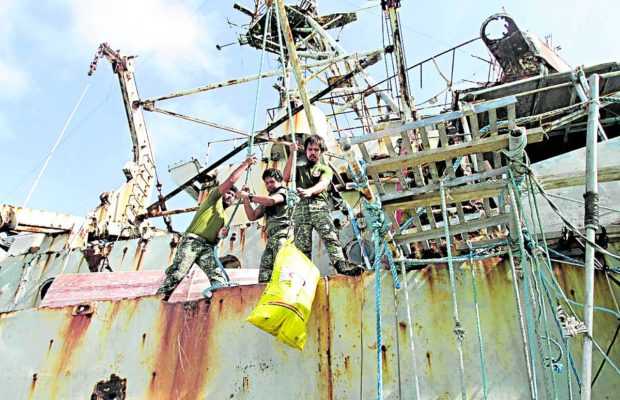
Philippine Marine troops stationed on the grounded and rusting BRP Sierra Madre at Ayungin Shoal receive fresh supplies in this photo taken on March 29, 2014. (File photo by GRIG C. MONTEGRANDE / Philippine Daily Inquirer)
MANILA, Philippines — Retired Supreme Court Senior Associate Justice Antonio Carpio on Tuesday suggested building permanent civilian installations at Ayungin (Second Thomas) Shoal and other parts of the West Philippine Sea (WPS) to enforce Philippine control over its waters.
Carpio made the proposal after two Philippine vessels were recently harassed by the China Coast Guard (CCG) and maritime militia at the shoal, where a decrepit World War II-vintage landing ship tank, the BRP Sierra Madre, serves as the country’s outpost in that part of the WPS.
The retired justice noted that in the latest incident involving the Chinese, their maritime militia boats dropped fishing nets to “block the usual entrance” to Ayungin, 194 kilometers off Palawan province, preventing Philippine boats from bringing supply to Filipino troops manning the outpost.
Later, a CCG rubber dinghy escorted the supply boats to the outpost via another route.
“China is establishing that they control Ayungin and our entry there is at their mere tolerance,” said Carpio, who has been using his legal stature in challenging China’s intrusion into the WPS, waters within the country’s 370-kilometer exclusive economic zone (EEZ).
Asked how should the Philippines counter China’s actions, Carpio said the vessels that deliver supplies to the BRP Sierra Madre should be escorted by additional ships of the Philippine Navy and the Philippine Coast Guard (PCG).
More permanent platform
The Sierra Madre was intentionally grounded at the low-tide atoll to serve as an outpost in 1999, four years after the Chinese illegally constructed permanent structures at Panganiban (Mischief) Reef despite protests from the Philippines. Panganiban is about 37 km northwest of Ayungin and well within the country’s EEZ.
The reef is now an artificial island, one of seven built by the Chinese over the past decade to assert Beijing’s expansive claims to the South China Sea.
“We should construct a more permanent platform with a lighthouse and marine research station (there),” Carpio told the Inquirer.
“The structure should be civilian so if China dismantles it, we can bring China to compulsory arbitration under Unclos,” he said, referring to the United Nations Convention on the Law of the Sea.
He pointed out that “military activities” were beyond the coverage of compulsory arbitration under the international convention.
Carpio, who has criticized outgoing President Duterte’s defeatist stance toward China, said that in the Philippines’ landmark 2016 arbitral victory, the tribunal’s ruling explicitly stated that Ayungin was within the country’s EEZ.
“Under Unclos, only the Philippines can erect a structure within its EEZ,” he said.
‘Up to next SND’
Asked to comment on Carpio’s proposal, Defense Secretary Delfin Lorenzana told the Inquirer in a text message: “I’ll leave that to the next SND (secretary of national defense).”
In November last year, two Philippine fishing boats rented by the government to transport food and other supplies for the Sierra Madre’s crew were forced to turn back after three CCG ships attacked and blasted them with water cannons.
Foreign Secretary Teodoro Locsin Jr. said the actions of the Chinese ships were “illegal” and warned that the attack could trigger the application of the 1953 Mutual Defense Treaty between the Philippines and the United States.
The DFA filed a diplomatic protest against the latest Chinese actions, and also against the return of dozens of Chinese maritime militia boats at Julian Felipe (Whitsun) Reef. China’s maritime militias masquerade as civilian fishermen who swarm disputed parts of the South China Sea.
Blocked by Chinese
According to a senior security official who spoke with the Inquirer recently on condition of anonymity, two supply boats that were headed to Ayungin on April 22 were escorted by the PCG’S BRP Cape Engaño.
But their usual route to the Sierra Madre from the east was blocked by the Chinese with nets and buoys.
Two CCG ships and four militia vessels were already in the area when they arrived. One of the CCG vessels deployed a rubber boat that approached the Filipino boats, telling them to follow it toward the Sierra Madre from a northern route.
The water in that part of the shoal was too shallow for the Cape Engaño to follow the smaller boats, leaving it watching the unloading of the supplies from a distance.
Reacting to the Chinese move, international maritime law expert Jay Batongbacal said the Chinese were making it clear that Philippine vessels could only reach the Sierra Madre with their escort or permission and that they can prevent this anytime.
“So, if we act the way they expect us to, we lose,” the University of the Philippines law professor told the Inquirer on Saturday.
—WITH A REPORT FROM FRANCES MANGOSING
RELATED STORIES
Carpio: Next president should protect PH’s marine wealth
Carpio: Chinese ships in West PH Sea reef could be a ‘prelude’ to occupation
Carpio to youth: Defend West Philippine Sea without letup